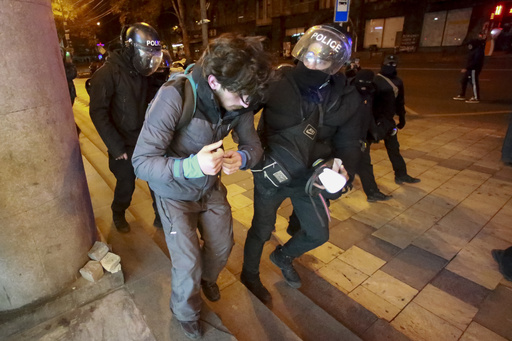
TBILISI, Georgia — Tensions erupted in Georgia as clashes broke out between police and citizens following an announcement that the ruling party would halt negotiations to join the European Union until 2028. The unrest unfolded after Prime Minister Irakli Kobakhidze of the Georgian Dream party made this declaration, prompting protesters to take to the streets late Thursday.
Authorities responded with force, employing water cannons, pepper spray, and tear gas to disperse the demonstrators. The unrest was sparked by public frustration over what many perceive as undemocratic practices, particularly after October’s parliamentary elections. These elections, held on the 26th, were declared a victory for the ruling party, but the opposition described them as fraudulent, a sentiment echoed by various European officials. The elections were seen as a test of Georgia’s commitment to EU aspirations, and the ruling party had previously assured voters of its intention to pursue EU membership.
Reports indicate that law enforcement detained 43 individuals during the protests. In a strong condemnation, President Salome Zourabichvili stated that the government’s actions constituted a “war” on its citizens, confronting riot police and questioning their allegiance—whether to Russia or Georgia. The president, primarily a ceremonial figure, accused the ruling party of election manipulation in collusion with Russia, reminiscent of the Soviet era when Georgia was under Moscow’s control. Zourabichvili labeled the decision to suspend EU negotiations as the “conclusion of the constitutional coup” that has been unfolding.
The government’s announcement arrived shortly after the European Parliament issued a resolution denouncing the elections as free or fair, indicative of escalating democratic regression attributed to the Georgian Dream party. Observers reported a heavily polarized environment during the election, highlighting instances of bribery, violence, and other irregularities.
Georgia received candidate status from the EU in December 2023, contingent upon meeting certain recommendations, yet earlier this year, the EU stalled its accession process after controversial legislation relating to foreign influence was enacted. This move was viewed as undermining democracy. EU lawmakers have called for a re-run of the parliamentary elections within a year under the supervision of independent international observers. They also suggested sanctions and a reduction in official interactions with the Georgian government.
Responding to criticisms, Kobakhidze labeled the comments from European politicians a “cascade of insults” and accused them of using the European Parliament as a tool for political blackmail against Georgia. He affirmed that Georgia would not be subjected to ongoing manipulation and reiterated the country’s commitment to pursuing its path toward EU integration. He emphasized the necessity for European officials to engage with Georgia respectfully, voicing intentions to refuse any EU budgetary grants until after 2028.
The Georgian Dream party, established by billionaire Bidzina Ivanishvili, faces accusations of increasing authoritarianism and a growing alignment with Moscow. Recent legislative actions reflect a trend towards limits on free speech and LGBTQ+ rights, mirroring measures taken by the Kremlin. Additionally, in June, the EU indefinitely suspended Georgia’s membership application process after a law mandated that organizations receiving significant foreign funding register as “pursuing the interest of a foreign power,” to the detriment of civil society.
